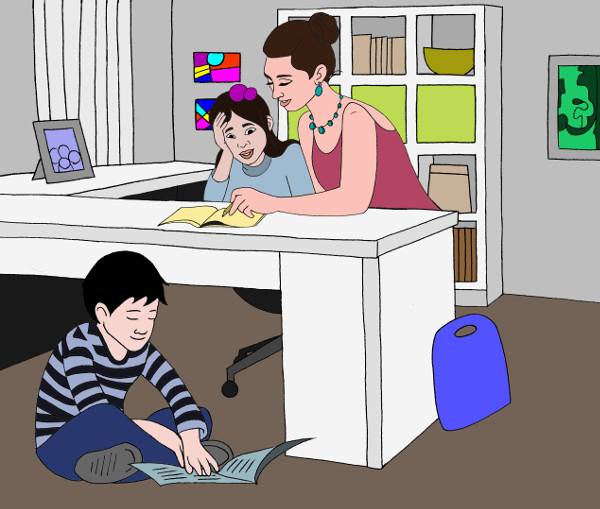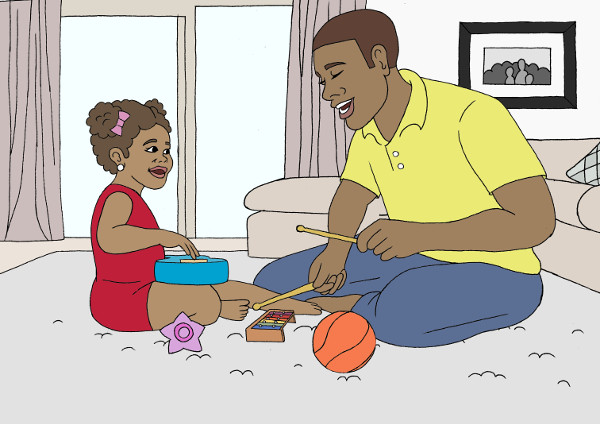The Positive Stuff
Powerful Specifics!
Your true power is in your POSITIVE interactions with your child Probably, you will start using the READY-SET-GO GENTLY pattern to respond to misbehavior. You will have success little by little. But it will not work like clockwork every time.
There is a reason for that. Your child, even by toddlerhood, has acquired many behavior patterns that “work” for her. It might not seem to you that the behavior patterns are working! But for your child, they have proven effective to get what she wants! (Your attention!)
So, when you start making changes, your child is going to double down on what worked before! Temper tantrums, throwing things, and rudeness, oh my! You may see MORE of all of that at first. That’s why the other half of your new technique is so important: the POSITIVE READY-SET-GO GENTLYs!
PLAY-PRAISE-READ-RESPOND-CONVERSE-EAT (PLEASANTLY TOGETHER)
Keep this in mind: The most important thing in your child’s world is YOUR ATTENTION. Even when children get older, ATTENTION is still the most important thing for them. During the middle school years, they become intensely concerned with the type of attention they get from their peers, and the whole thing gets tricky. But for all ages, the starting place is the home. The need for an affirming home base continues into high school and young adulthood.
Providing a strong home base is straightforward, and it has nothing to do with money or where you live.
In any given day, your responses to “good” behavior must outnumber your responses to “bad” behavior.
YOU must make this happen. Your child cannot.
POSITIVE EXAMPLES WE HAVE ALREADY SEEN
- Devin eventually did what Benji asked in the park. Benji then used his cell phone to find pictures of pigeons, and they spent time looking at pigeon pictures together.
- Devin and Kyleigh were fussing, but April found simple household tasks for them to do, and then she praised them for “helping.” Soon, everyone felt much better.
- Chantelle always kept Zylvie looking very attractive, so that Zylvie got lots of compliments.
- With a little guidance, Chantelle learned to talk to Zylvie more. There was an ad in the store with a picture of a baby, and Chantelle began to point to it every day and say, “Baby!” Then Chantelle and Zylvie would laugh together. Zylvie didn’t need to be “bad” to get attention. Soon, Zylvie would point to the baby and they would laugh.
YOU undoubtedly have many ideas for positive things to do with your children. Claim them. Be aware of them! Do them every day. Most positive interactions are VERY simple and VERY important!
AN EVERYDAY EXAMPLE
Another mother in our town, Kristen Gordon, does not believe in discipline at all. (Kristen has some learning to do about that.) However, Kristen does a lot of positive interacting with her children. She is creative, and many of her ideas work well. Let’s see what we can learn from Kristen’s positive side.
One afternoon, Kristen picked up Makayla (age 4) and Matthew (age 6) from school, and they stopped by the Farmer’s Market on the way home. Kristen bought some locally-grown vegetables, while the children ran around wildly. Miraculously, they did not knock anything over nor harm anyone. Now they are home. Kristen is in the kitchen slicing fresh vegetables with a sharp knife. Makayla and Matthew are contentedly looking at Nature magazines in the den! This is wonderful! Kristen is trying to get done with the knife while all is calm.
It would seem that no action is needed here other than getting supper ready. BUT...perhaps that is not the case! Remember, children are always on “GO.” In this case, they are behaving quite delightfully. This is an opportunity for praise!
Here is Kristen’s POSITIVE GO GENTLY.

Kristen puts the knife out of reach, and she walks over to the den. Kristen says, “I am so proud of you two for looking at your magazines nicely and letting me have time to cook. Can you both show me something you like in your new magazine?”
The children both begin talking at once. Matthew starts explaining in detail about the nesting habits of an African parrot. Makayla wants to work a maze leading to the home of a mother sloth and her babies. Kristen takes several minutes to interact with both children. Then, she asks if they would like to help finish up the supper preparations. Makayla chooses to help; Matthew prefers to continue with the magazine. That is fine! Kristen allows Makayla to use the sprayer to wash some fruit in the sink. Makayla sprays a great deal of water about the kitchen, but no harm is done since it is only water.
This is an example of great parenting, and great parenting that is HARD TO DO! When our children are playing quietly, our natural tendency is to leave them alone! But they still need our attention!
POSITIVE EXAMPLES FOR A YOUNG CHILD
John Martin, aged 18, is Esther Martin’s youngest son, and he is also Zylvie’s father. He gets Zylvie every other weekend. Here are some things that John likes to do with Zylvie:

- They sit on the floor and play with toys.
- He likes to touch her hair playfully and gently.
- He likes to swing her up in the air.
- He sits her in his lap and reads her stories.
- He thanks her when she is helpful.
When Zylvie gets a little older, John will add these types of things:
- Coloring with Zylvie.
- Eating together at the table with her.
- Cuddling with her on the couch and watching her favorite TV shows TOGETHER.
- Listening to her talk about anything at all! (Zylvie will be VERY talkative by the time she is about 2½.)
- Pretend play, such as asking her what her dolls and stuffed animals are doing and playing with them.
John will also do physically active things with Zylvie.
- He will take her to the park, and they will play chase together.
- He will play ball with her.
- John is a tuba player, and he will play music with her.
- Zylvie loves to hear the ABC song on the tuba!
PITFALLS and TIME-WASTERS
Giving our children positive attention is not difficult, but there are MANY things that get in our way! BEWARE of these common pitfalls:
- Our child wants us to look at something trivial, but we are busy, so we ignore him.
- We spend lots of time looking at our cell phones instead of talking to our kids.
- We let everybody watch their own TVs in the evening, and we don’t interact.
- We overschedule ourselves and everyone else so that no one really is getting any attention.
- We are working too hard and too many hours.
A good plan is to start with the simplest possible ways to give your child more attention. It’s hard to change jobs, but it’s EASY to put down your cell phone!
POSITIVE EXAMPLES FOR OLDER CHILDREN
- Elementary school kids enjoy interactions with their parents.
- They are easy, because they like almost any type of activity.
- They like to go to a park or playground or swimming pool or take a walk together around the block.
- They like to help you, if you talk with them while you work.
- They like for you to look at and admire their schoolwork.
- Indeed, they like for you to notice anything they are doing!
- They will even do chores if they receive praise (an allowance helps too!)
It takes some time and effort, but the possibilities are many at this age!
Middle School age is a bit more difficult. The key is to create a situation where you are together with your child, and hopefully, THEY talk, and you LISTEN.
For boys, positive interactions are facilitated by food! Provide a snack for your 13-year-old son, and once he is chowing down, you can sit down at the table with him. If you ask him what he did that day, he will say, “Nothing.” A better place to start is by talking about something YOU did during the day. You can ask his opinion about it. He may have some comments, and if you are lucky, he MIGHT start talking about his day. Even if he says nothing, he will internally feel pleased that you shared with him. Keep up a daily snack time together, and LISTEN if he does talk. Be very careful not to criticize him during these times!
For girls, riding in the car together offers opportunities to talk and listen. If you are with your daughter, with no distractions, most likely she will talk. Girls love to talk! Listen attentively while she tells you a long, detailed story about her friend’s difficulty with another girl. Ask her what she thinks: DON’T lecture about what the friend ought or ought not to have done! If you can keep this up, you will soon be feeling pleased about how much she will share with you!
TEENAGERS!
Oddly enough, there is a scientific study that gives us a big clue about what works with teenagers! It’s not what you might think. The study was done in a neighborhood with a below average household income; an area that some might consider “rough.” The teenagers who were doing the best (good grades, good school attendance, not getting pregnant or arrested), were those who had regular family meals together with their family members! So, make mealtime a priority! Sit down and eat together. Turn off the electronics, and look at each other, and TALK. It’s not easy. But providing regular food and meals is HUGE.
No matter what the socioeconomic neighborhood, if you can provide a regular evening meal, you will have not only your own children coming home to eat, but also their friends. You can talk with them and know who they are. If you are willing to courteously listen to them, ultimately you will be able to guide them and set a good example for them! You may very well save their lives!
QUICK SUMMARY OF YOUR POSITIVE GO GENTLYs:
PLAY – PRAISE – READ – RESPOND – CONVERSE – EAT!
- PLAY with your child.
- PRAISE your child for good behavior. Say “thank you” often to your child!
- READ to your child.
- RESPOND courteously to requests from your child.
- HAVE CONVERSATIONS with your child.
- EAT PLEASANTLY with your child.
Your child will do whatever works to get your attention!
So, the more of these things YOU do, the more GOOD and more COURTEOUS behavior your child will produce!
YOUR CHILD can be the one with good behavior, courteous requests,
pleasant mealtimes, and a love of reading!
Because you can give those things to him.

